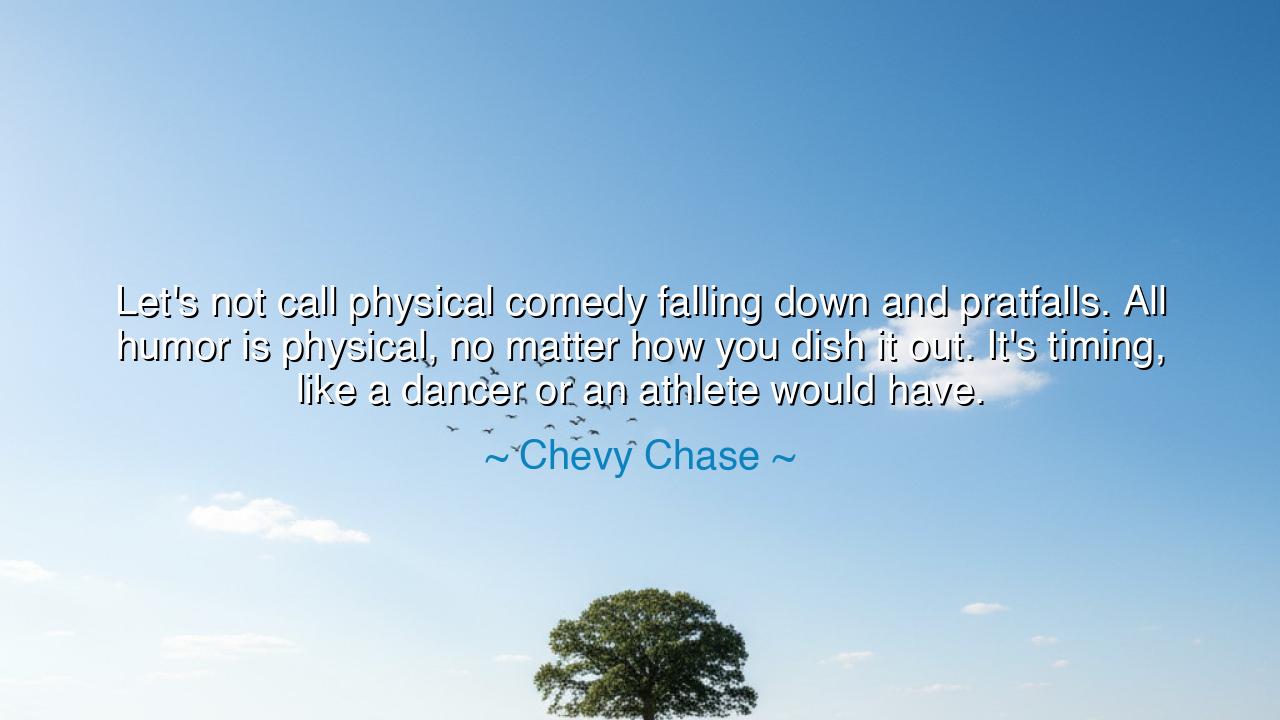
Let's not call physical comedy falling down and pratfalls. All
Let's not call physical comedy falling down and pratfalls. All humor is physical, no matter how you dish it out. It's timing, like a dancer or an athlete would have.






The words of Chevy Chase carry the voice of an artist who understands the sacred rhythm behind laughter: “Let’s not call physical comedy falling down and pratfalls. All humor is physical, no matter how you dish it out. It’s timing, like a dancer or an athlete would have.” What he speaks here is not only about the art of making others laugh, but about the essence of performance itself — the union of body, mind, and spirit in perfect harmony. Beneath his casual phrasing lies a truth the ancients knew well: that laughter, like music or battle, demands discipline, rhythm, and grace.
To the untrained eye, comedy may seem effortless — a mere joke, a stumble, a punchline. Yet, as Chase reminds us, all humor is physical. Every gesture, pause, and expression is a dance of energy between performer and audience. It is not simply what is said, but how it is said — the lean of a shoulder, the flicker of an eyebrow, the subtle breath before the joke lands. The laughter that follows is not conjured by words alone, but by the invisible timing, the precise rhythm that transforms speech into art.
The ancients, too, revered timing as the heartbeat of greatness. The Greek tragedians taught their actors that emotion without rhythm is chaos, and humor without control is folly. The gladiator who misjudges his strike, the dancer who steps too soon — both fail, not for lack of skill, but for lack of timing. So too the comedian, who, in the instant before laughter, must feel the pulse of his audience and strike exactly when the spirit calls. In this, Chase’s wisdom reaches beyond the stage: he speaks of the eternal law that governs all creation — that timing is life’s hidden architecture.
Consider the art of Charlie Chaplin, the silent sage of cinema. Without uttering a word, he could summon oceans of laughter or tears. Why? Because his entire body was an instrument of humor — every tilt of his hat, every pause before the fall, every silent glance to the heavens carried perfect rhythm. His comedy was not about clumsiness or pain; it was physical poetry, crafted with the grace of a dancer and the focus of a warrior. Chaplin proved, as Chevy Chase declares, that comedy is not chaos, but choreography — the divine balance between instinct and control.
In truth, humor mirrors the great movements of life itself. The universe, too, dances in timing — the turning of the planets, the rhythm of the tides, the pulse of the human heart. To make another laugh is to step briefly into that rhythm, to remind them that they, too, are part of a living harmony. The performer becomes a bridge between the ordinary and the extraordinary, turning pain into play, confusion into connection. Chase’s insight reveals this sacred aspect of laughter: it is not the act of falling, but the act of rising with grace, of mastering movement so completely that it appears effortless.
The lesson, then, is this: do not mistake mastery for accident. Whether in comedy or in life, what appears natural has been honed through discipline. The athlete trains their muscles; the comedian trains their timing. To bring joy to others, you must first learn the rhythm of yourself — your voice, your breath, your awareness. Practice your craft until it flows like water, until your gestures are not forced but felt. For in that harmony lies power — the power to move hearts not through force, but through flow.
And so, dear listener, take these words to heart: life itself is a performance of timing. The laughter, the tears, the triumphs, the stumbles — all depend on the rhythm you keep. Learn to move with grace, to wait with patience, and to act in your own perfect moment. For as Chevy Chase teaches, humor, like dance, is the celebration of being alive — the body, the mind, and the soul moving as one. When you find that rhythm, even the simplest gesture becomes art, and even the smallest moment becomes joy.
Thus remember: to live well is to live rhythmically, to laugh deeply, and to fall — not into foolishness — but into flow. The true artist of life, like the true comedian, does not chase applause; they master timing, and through that mastery, they bring light to the hearts of others.






AAdministratorAdministrator
Welcome, honored guests. Please leave a comment, we will respond soon